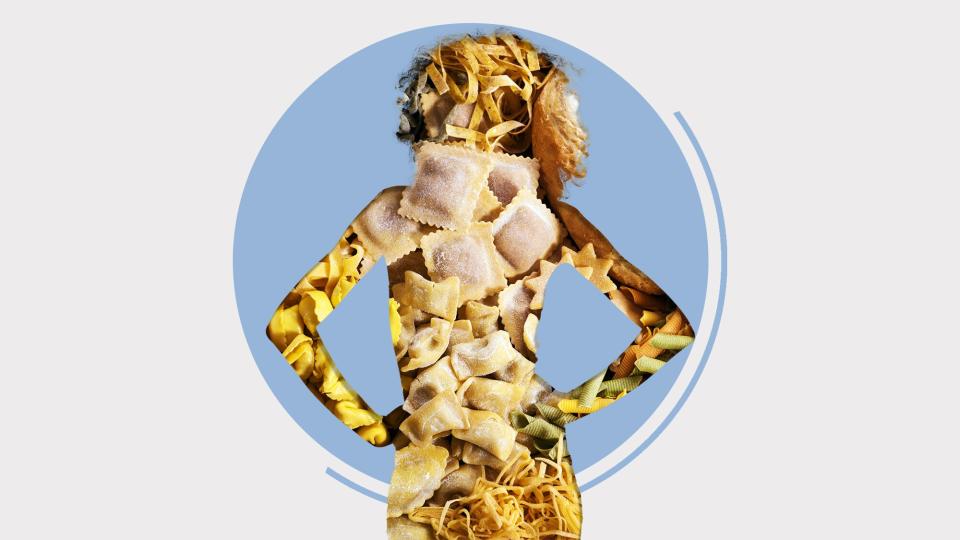Why Eating Carbs Won't Lead to Weight Gain, According to New Research
Go ahead, use your noodle. We never stopped doing just that, but we also know that a solid chunk of Americans (about 15% or so, according to a February 2020 survey by the International Food Information Council) will at least try to stick to a low-carb or keto diet this year.
If weight loss is your goal by living the low-carb life, you might want to rethink your strategy, scientists now say. That's because we're learning more about one popular theory—the one that suggests carbs in foods spike insulin, which in turn boosts appetite and triggers fat storage. But this "carbohydrate-insulin model" might be oversimplifying things, say two scientists who recently published an article in the journal Science.
John Speakman, from the University of Aberdeen in the United Kingdom, and Kevin Hall, from the National Institute of Diabetes and Digestive and Kidney Diseases in Bethesda, Maryland, suggest that low-carb, high-fat diets can lead to weight loss in some. However, the weight is likely more directly controlled by the overall calorie balance (known as the energy balance model).
"The role of insulin in obesity may be better understood by considering its action on multiple organs that is driven by factors mostly independent of carbohydrate intake. Reconsidering the role of insulin may improve our understanding of the causes of obesity and its treatment," they say.

The duo acknowledges that insulin does play a part in body fat regulation, but suggest it's highly unlikely that eating higher-carb foods is solely responsible for any potential weight gain. To make this assertion, they give a nod to a February 2020 Molecular Metabolism study that tracked the impacts of 29 different diets on body fat among mice. Sixteen of the 29 diets maintained a consistent protein intake while adjusting to total fat, carb and calorie intake. According to the carbohydrate-insulin model, the mice on the higher-carb diet should store more fat and eat more calories due to larger insulin spikes.
Related: Eating These 7 Nutrients Could Help You Lose Weight Faster
After 3 months, which is about equal to 9 human years, the mice on the higher-carb diets actually ate fewer calories, gained less fat and had lower body weight—even with more insulin circulating in their bodies. Speakman and Hall admit that it's too early to say whether this holds true in people, but other human studies hint at similar findings, they say.
Case in point: A January 2021 study in the journal Nature Medicine that placed participants on one of two 2-week diet plans. One had a macronutrient breakdown of 10% carbs and 75% fat; the other was 75% carbs and 10% fat. Both consumed 5% protein, and were told to eat as much as they desired. The higher-carb eaters did experience larger insulin spikes after eating, but like the mice, they ate fewer calories, lost a significant amount of fat and reported feeling just as satisfied on the higher-carb plan as those on the lower-carb plan.
Insulin "is best understood as part of a dynamic network of factors controlling and mediating the effects of energy imbalance," Speakman and Hall say.
Related: Why I Don't Believe In Calorie Counting, According to a Dietitian
Responding to this news, Naveed Satar, a professor at the Institute of Cardiovascular and Medical Science at the University of Glasgow, tells Medical News Today that when low-carb diets lead to weight loss, it's probably due to a lower calorie intake level—not from the carbohydrate-insulin model. Satar's own 2017 research found that the excess calorie intake comes more often from fat instead than sugar. As a result, Satar believes that a lower calorie and lower fat diet might lead to better results for those trying to shed pounds.
"People who go on low-carb diets tend to eat less as they increase protein intake, which tends to suppress appetite a little," Satar says.
Regardless of how or why the pounds come on or off or what eating plan you tend to follow, it's crucial to remember that the number on the scale is only part of your overall health profile. Other important factors—like keeping active, staying socially connected, not smoking, etc.—are important (possibly even more important than weight!) if you're seeking to live a long and healthy life.
Considering adding more carbs back to your menu? Leaning into the best sources can help you feel your best. Check out 6 carbs to eat to help you lose weight and learn more about good carbs vs. bad carbs.

